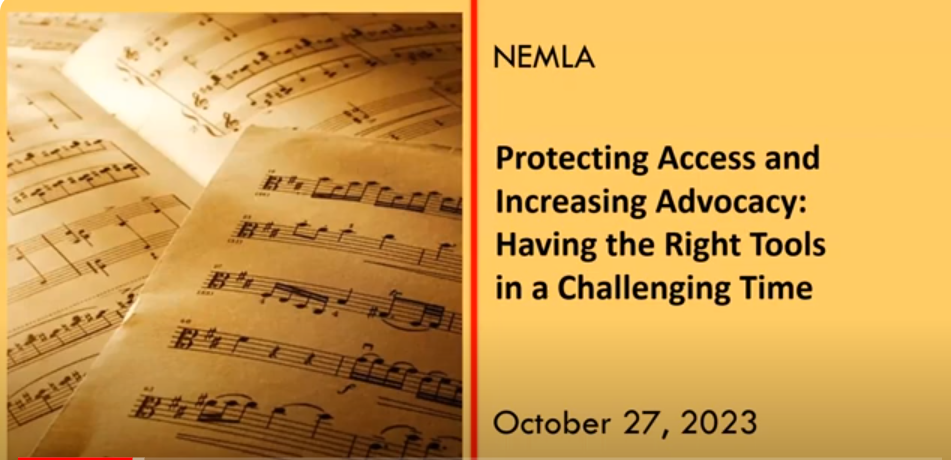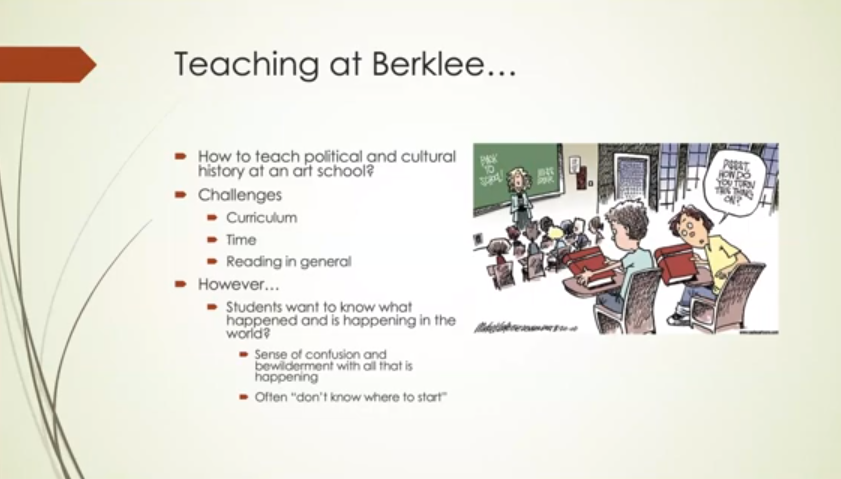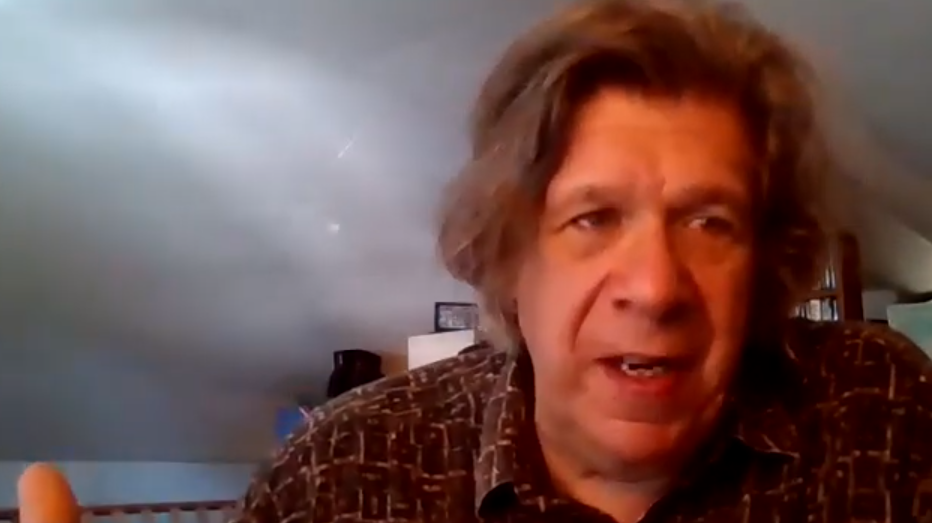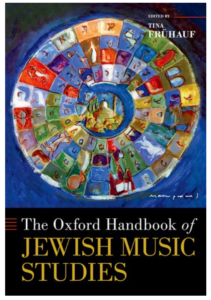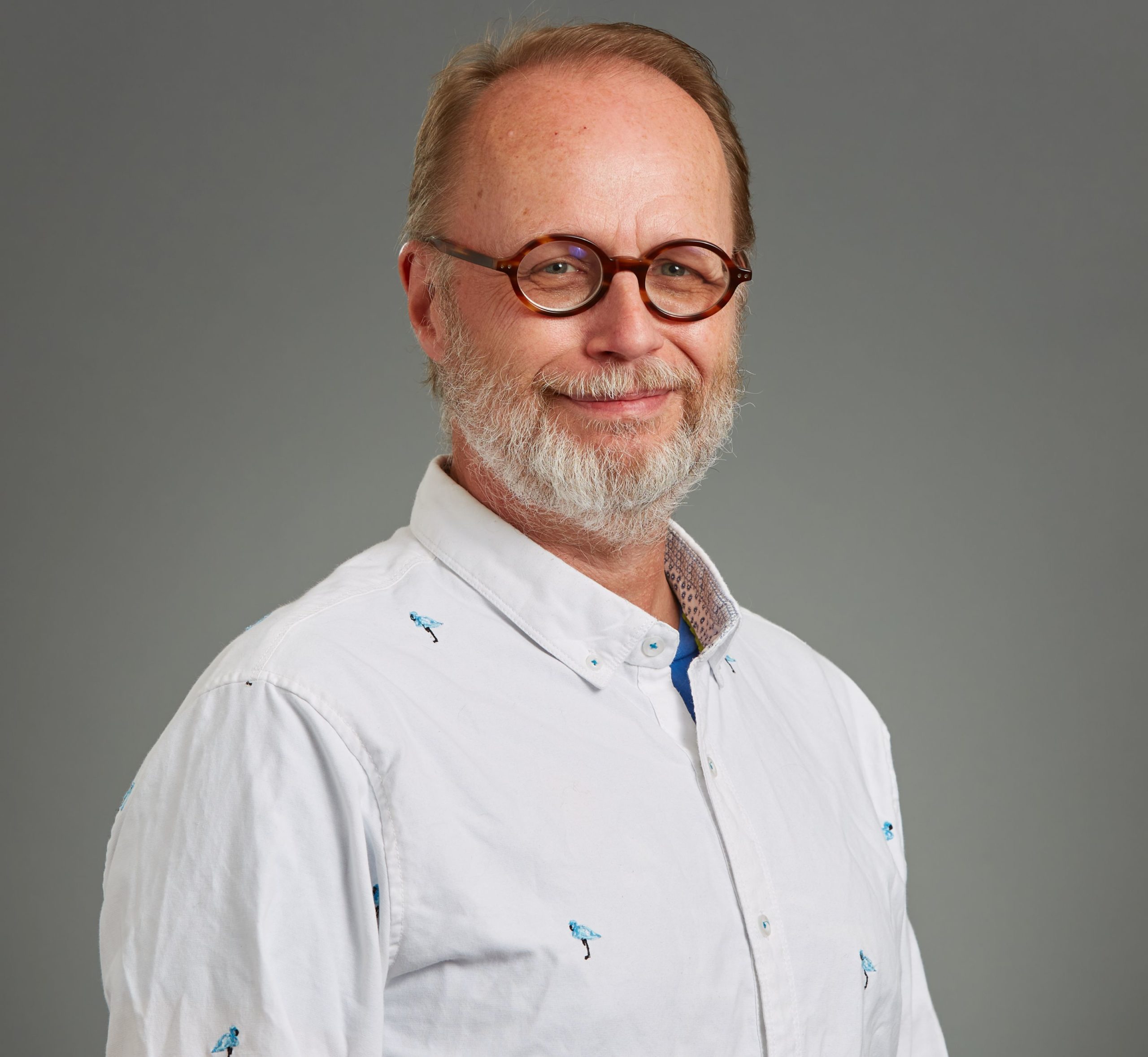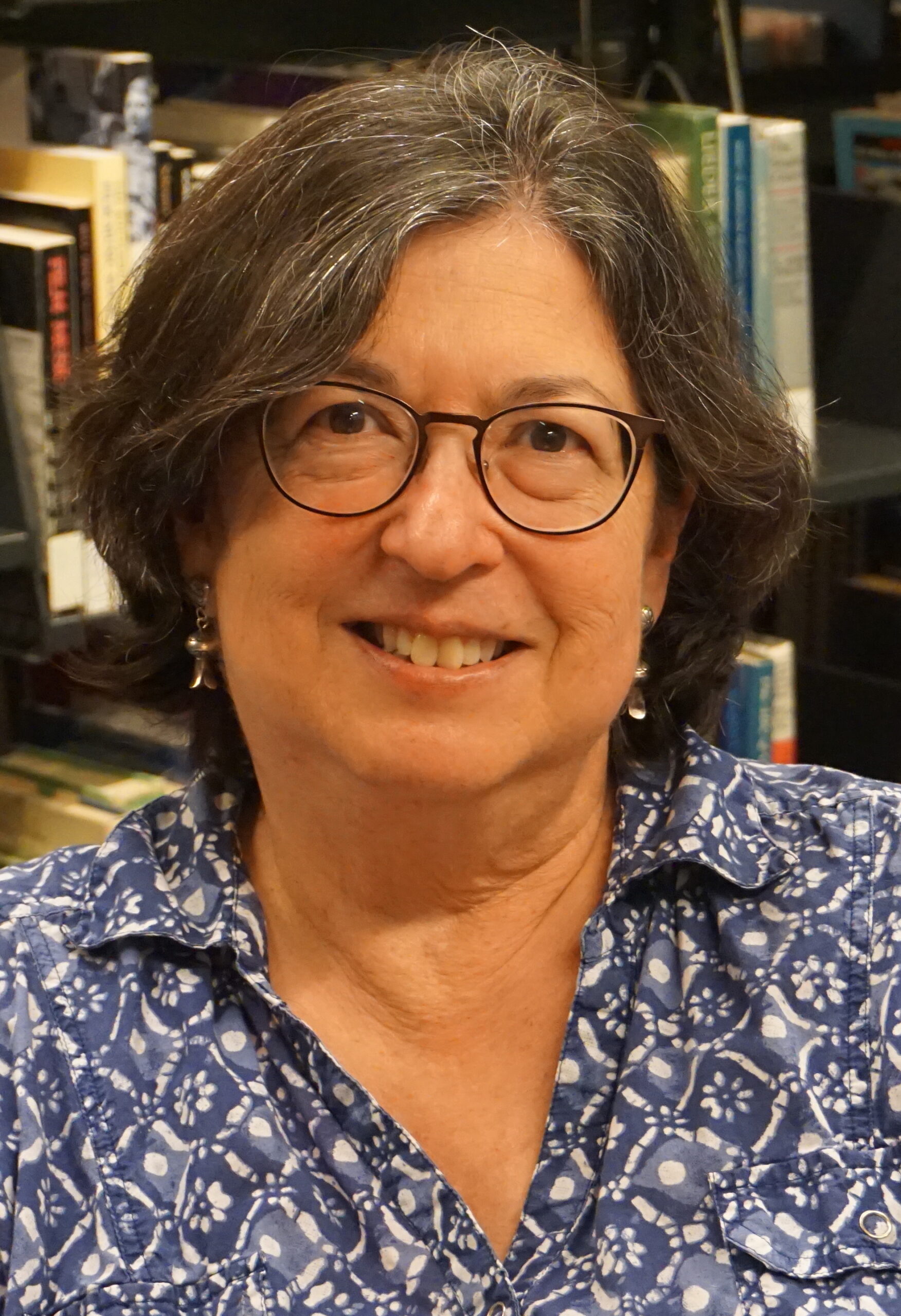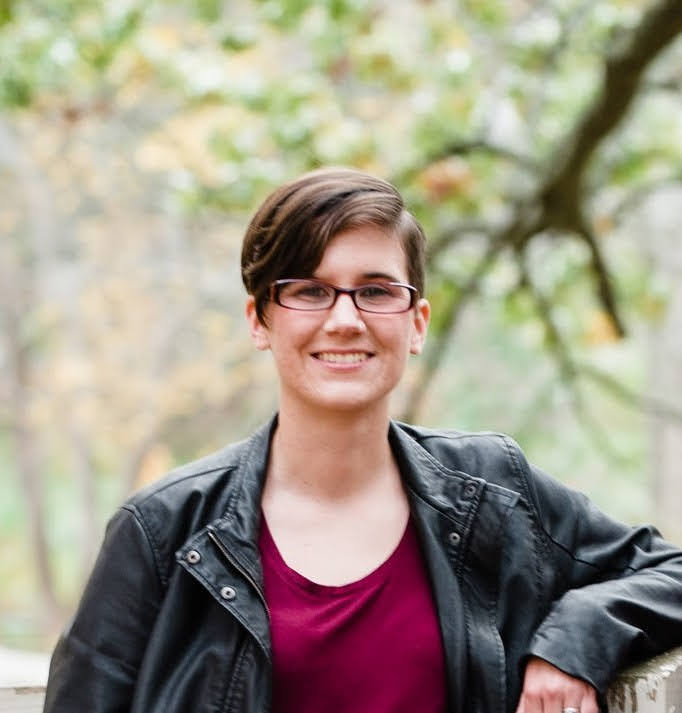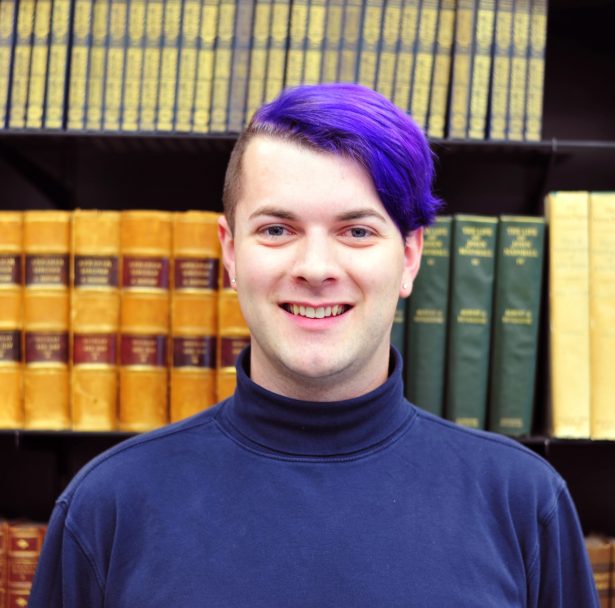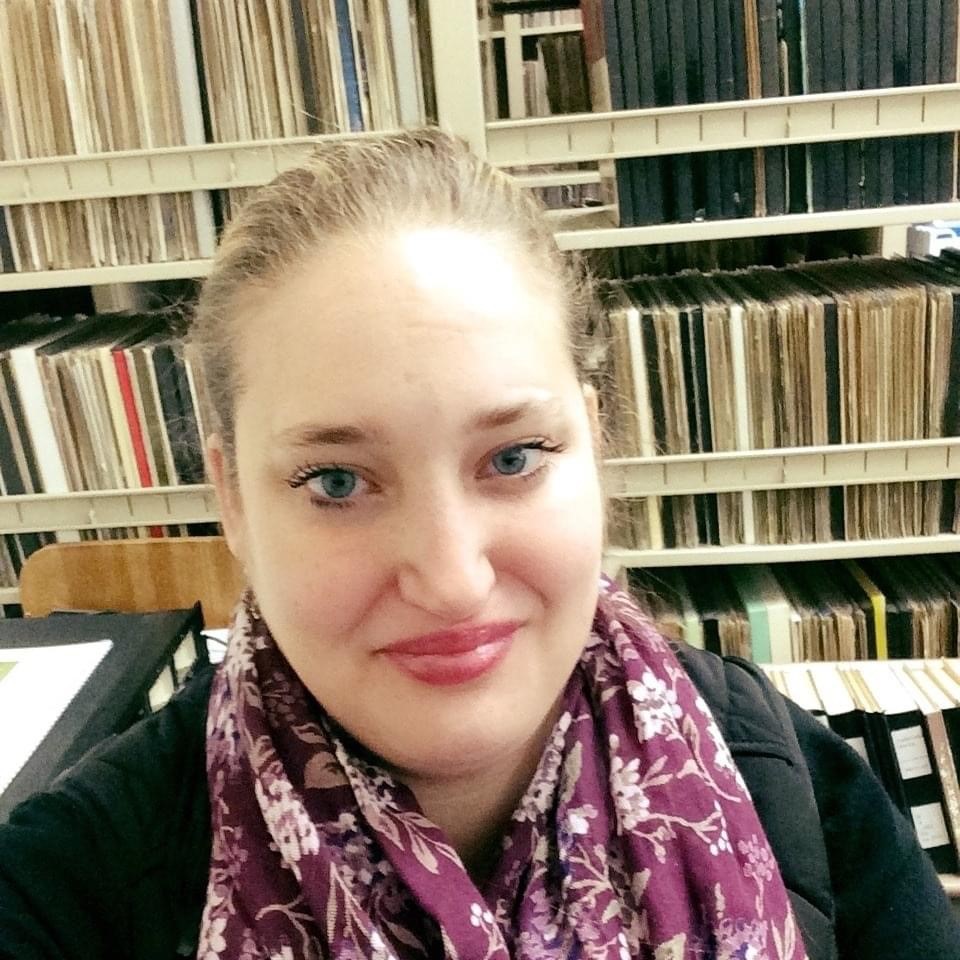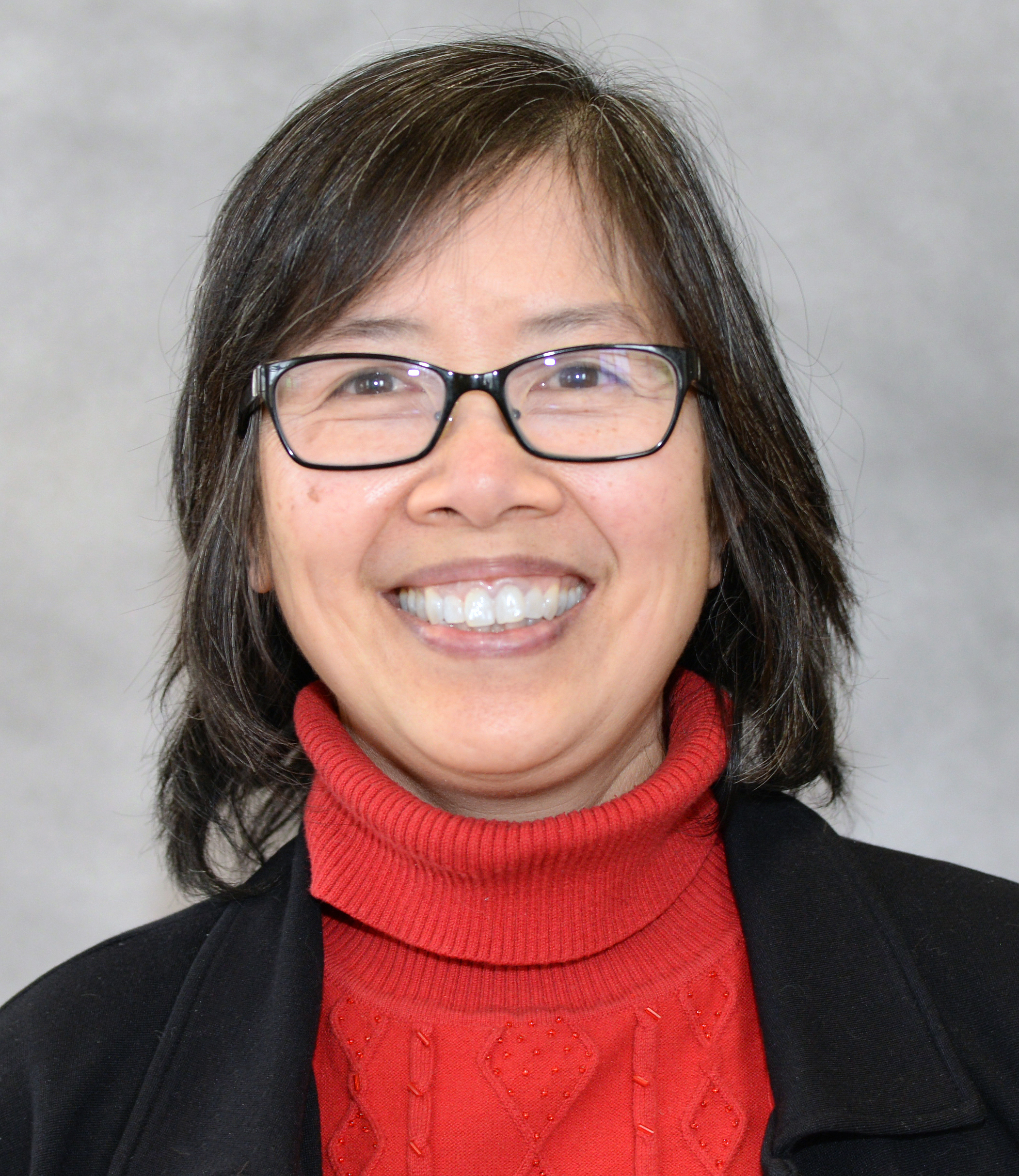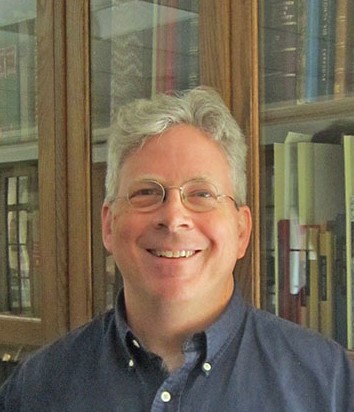Table of Contents
Message from the Chair
NEMLA Fall 2023 Chapter Meeting Summary
Spring Meeting Save the Date!
NEMLA Membership Renewal
Noteworthy News
— Jewish Music Sound Recording Collections in the United States
— Monica Ruiz Joins Alphin Library
— Hidden Volumes Returned to Olin Library
— Library Praised in Wayang Kulit Performance
— More Photos from the Spring 2023 NEMLA Meeting
NEMLA Officers
Publication Information
**************************************************
Message from the Chair
Dear NEMLA members
I’m sure everyone is looking forward to the end of our semesters and, hopefully for all of you, the opportunity to disconnect from our work lives and “recharge” a bit.
I want to thank everyone who participated in our fall virtual chapter meeting. Those of you who missed it will be able to read about the sessions in this newsletter, but in general it was a timely and fascinating discussion of various aspects of censorship in libraries both writ large and specific to music librarianship. Judy Pinnolis and the Program Committee did a terrific job of lining up speakers.
We are still (!!) looking for a NEMLA archivist, as well as new blood for the Program Committee as we head into the details of planning for the spring meeting at Smith College. Please contact me (tsimpkin@middlebury.edu) if you have interest in either position or Judy directly (jpinnolis@berklee.edu) if you would like to help with the Spring planning.
Have a great holiday break, everyone!
Kind regards
Terry Simpkins
Director, Discovery and Access Services
Middlebury College
Middlebury, VT
tsimpkin@middlebury.edu
NEMLA Fall 2023 Chapter Meeting Summary
NEMLA’s Fall 2023 Chapter meeting on the “all-too-timely” topic of “Censorship in (Music) Libraries” took place on Friday, October 27th, via Zoom. The highest (fluctuating) number of attendees resulted in approximately forty-six participants. The day started at 9:45am and wrapped up a few minutes after 3:00pm. Terry Simpkins, Director of Discovery & Access Services at Middlebury College Library in Vermont, and NEMLA’s President, introduced himself, graciously expressing his excitement for being in this presidential role, while also acknowledging Past-President, Memory Apata, for taking on such a strong, leadership role in NEMLA, previously. Terry welcomed everyone to the meeting, giving a few remarks. He started out by introducing each member of NEMLA’s Executive Board, and giving Judy Pinnolis, Associate Director of Instruction & Engagement at Berklee College of Music Library, NEMLA’s Vice-Chair/Chair-Elect, and new Program Committee Chair, praise for organizing such a terrific program of events for the Fall 2023 meeting. Terry voiced the importance and need for NEMLA members interested to join any of the committees, giving strong emphasis to the Program Committee, since members involved, engage in planning future NEMLA Chapter meetings. Terry also mentioned the current absence of a NEMLA Archivist and asked anyone interested in fulfilling this role to reach out. After advertising the afternoon “schmooze” session to brainstorm ideas for the Spring 2024 meeting, Terry turned things over to Joanna Fuchs, Metadata Coordinator for Arts and Humanities at Brandeis University, to introduce the first speaker of the morning.
Joyce McIntosh, Assistant Program Director of the Freedom to Read Foundation at the American Library Association (ALA) presented the first session of the morning, at 10:00am. Her presentation titled “Protecting Access and Increasing Advocacy: Having the Right Tools in a Challenging Time”, brought about well-rounded perspectives surrounding the knowledge behind what types of book banning challenges have existed, and continue to do so, over the last ten years in the United States. Most book-banning challenges in public and school libraries concern race, LGBTQIA, and sex education content, and can impact Black and Indigenous populations disproportionately. School and public librarians/libraries and administrations alike, also deal with pushback from parents of minors, individuals and communities as a whole, who are threatening librarians and boards of trustees–those responsible for curating collections–to remove certain materials that they find offensive. They are going even further to defund such establishments. However, Joyce also talked about individuals having rights to access information, according to the First Amendment, which enable them to defend their statutes and rights to access the various materials they wish to read or listen to. The First Amendment also allows librarians and boards of trustees to consult their collection development policies every time a book is challenged in their library.
Lastly, Joyce expressed the ways in which individuals and communities can best serve as advocates for protecting against book bans and varying challenges against those who continue to attempt book-removal from library collections in public and school libraries. Some of these advocacy efforts include: running for office on the school or library board affiliate, educating oneself and others as much as possible, in addition to talking with people about what kinds of materials they want to see in libraries, as opposed to closing doors to accessibility, and instead, contributing to community resources. It is also extremely important to keep the Constitutional right to access information in mind, when defending patrons’ rights when they want to check out materials of their choosing. Lastly, not all materials are suitable for everyone. By the same token, it is the individual’s responsibility–including the parent’s responsibility if the individual is a minor–to select or ask for alternate material if he or she is not comfortable with the former. Joyce closed her presentation, giving a nudge to NEMLA members, to visit the website UniteAgainstBookBans for more information.
Carol Lubkowski, Music Librarian at Wellesley College (Massachusetts), introduced the next speaker of the morning, Dr. James Bradford. He is the renowned author of Poppies, Politics, and Power, Afghanistan and the Global History of Drugs and Diplomacy and Associate Professor of History, in the Liberal Arts and Sciences Department, at Berklee College of Music. His presentation, “Perilous Waters: Navigating Pressures of Censorship, Political Polarization and Intellectual Freedom in the College Classroom”, explored a variety of challenges intersecting with how he teaches upper-level political/cultural history classes, as well as those circling drugs and addiction, and how they are relative to issues surrounding human rights and crime. Throughout Dr. Bradford’s years in teaching various world themes he encounters in his courses such as Global History of Drugs, he finds the discussion aspect of class most crucial. Students are able to dedicate time to learning about what is going on in the world around them; they want to hone the proper tools and skills needed, to engage themselves fully to form well-rounded, unbiased opinions about issues brought up in classes.
The biggest challenges Dr. Bradford grapples with regularly is figuring out the best way(s) in which to educate his students amidst this present political climate on the issues they want to know more about, while also feeling out the limitations and willingness of what they can and cannot do time-management-wise, since they have competitive workloads for other music-centered courses. Dr. Bradford has observed over the years that while the students like to dive into various issues and be informed, they prefer to find information from possibly less-reputable sources such as YouTube videos/channels, X (formerly Twitter), and other social media platforms, and podcasts, as opposed to going a more wholesome, traditional route as simple as reading. He recognizes that going the former research route is more of an “instant gratification” for the students. It is much easier for them to grasp this material, because for one thing, it is all at their fingertips essentially. This also makes a strong case for the material to be more digestible, given their time constraints. Dr. Bradford finds that the best way to combat these challenges is to be deliberate and purposeful in material-selection that specifies relatable content and themes, hoping to captivate the students’ focus more effectively. His intention is to start building a more solid foundation for the students to form a different way of well-educated thinking that can be applied to his courses throughout the semester, as well as in life overall.
Judy hosted an informal “schmooze” gathering after lunch for the next half-hour, beginning at 1:30pm. This time was critically utilized for participants (roughly eighteen) to briefly introduce themselves, and to brainstorm potential themes and ideas for NEMLA’s Spring 2024 meeting held in-person–and possibly hybrid–at Smith College, in Northampton, Massachusetts, on Friday, May 31, 2024. While Terry, NEMLA’s President was introducing himself, he expressed his excitement for this session and future sessions carved out in the day, as an informal space for members to bounce ideas around for the next and forthcoming NEMLA Chapter meetings. Terry also gave one final pitch for anyone interested in joining NEMLA committees, and especially the Program Committee, to reach out to himself (tsimpkin@middlebury.edu) or Judy (jpinnolis@berklee.edu).
The two main goals for the Spring 2024 meeting are for (1) the presentations to be more musically focused, and within that, to (2) primarily concern activities that people are doing in (music) libraries today. Judy welcomes help from NEMLA members across the membership as well as those who were in attendance of the Fall 2023 all-virtual meeting, for receiving submissions for topic ideas, such as the pressing topic of AI (artificial intelligence) in music libraries, which was mentioned during the “schmooze”. AI in music libraries currently seems to be a strong contender, which Judy continues to explore in a more serious light, since she recognizes it as a prevalent initiative evolving in most places today. If anyone in the NEMLA membership has any ideas or suggestions, please reach out to Judy.
Marci Cohen, Head of Research Services for Instruction and Consultation at Boston University Libraries (Boston, Massachusetts), introduced the day’s third and final speaker that afternoon, at 2:00pm. Brett Milano, a prolific journalist and writer on his own merit, gave a fascinating talk titled “I Bet You They Won’t Play This Song on the Radio: The Uncensored History of Music Censorship”. The first part of his presentation’s title, cleverly comes from the eleventh track’s title on the final studio album by Monty Python, released in 1980, called “Monty Python’s Contractual Obligation Album”. It also set the tone for the presentation in its entirety. Brett took viewers (about twenty-eight) through a journey of musical censorship from the thirties and forties, through contemporary music and artists on the scene today. When it comes to censorship and what to play or not play on the radio, Brett pointed out that it is and has always been “cyclical”, and that popular music goes through “permissive” and “repressive” times at one point or another, and sometimes both, simultaneously.
Brett demystified the thought that musical censorship in terms of pop culture influences go back to Rock ‘n’ Roll. He instead contradicted that statement, saying they go back to the thirties and forties, such as in songs like “I Get a Kick Out of You” by the prolific composer, Cole Porter. This song is extremely well known. However, the proper and original lyrics that Cole Porter wrote are often never the ones heard today. American Swing-Jazz singer and actor, Frank Sinatra, sang this version. The lyrics in this version make direct references to alcohol and drugs such as champagne and cocaine. Brett points out that these lyrics were at the time, primarily censored because of the Hays Code, which set standards for what was and was not acceptable to show in a motion picture at that time. The song “I Get a Kick Out of You” was originally written for the musical “Anything Goes”, which was later adapted for the screen in 1936. Therefore, the lyrics were changed to reference perfume instead, which is what one hears in most versions recorded since. When dealing with the early days of pop culture and Rock ‘n’ Roll, there were many social norms that motivated the elimination of certain words and ideas, either in music or on the radio. This concept according to Brett was more acceptable and “free-willing” in Blues and Jazz traditions.
Moving on into the late seventies, Brett discussed the scandalous events happening in England over the Sex Pistols’ 1977 release, “God Save the Queen”, as it was viewed atrociously offensive–especially to the Queen of England–because of the repetitive mention of the word “God” in the title and the song. According to Brett, the charts refused to put the song in its rightful spot as number one, and replaced it with another record instead, resulting in pushing “God Save the Queen” into the number two spot. Despite the pushback, this particular record sold many copies generating a lot of money during that time. England did not actually suppress the record from stores; they only stopped talking about it, attempting to prevent people from listening to the record.
Brett rounded out the timeline and musical genres relating to the idea of censorship by introducing aspects of Hip Hop and Rap and how the battles were getting more serious, such as in the song “Rapper’s Delight” by the Sugar-Hill Gang, released in 1979. However, as more pressing issues were becoming increasingly political and global in the late 1980’s, Black communities were greatly affected and had a lot to say. America had its own rap version of “God Save the Queen”, as in a song by the NWA addressing police brutality and mistreatment of minorities, an example of the community’s response of fighting back through their lyrics. Extreme circumstances resulted in arrests for selling certain records in stores, such as was the case with a record seller in Florida, who attempted to sell the 1989 album “As Nasty As They Want to Be ” by 2 Live Crew. Law enforcement later also arrested the group for creating an album with vulgar, graphic and suggestive humor. Brett mentions that the group followed this album with another one, one year later in 1990, called “Banned in the USA”. Of course, they got permission from Bruce Springsteen to sample his song “Born in the USA”.
Despite some technical difficulties, NEMLA members including Marci, Judy and Terry, were able to provide a variety of resounding anecdotes that filled the vacant space with their own nostalgic contributions throughout. Brett closed his thought-provoking talk speaking about how the band formerly known as the Dixie Chicks criticized former President George Bush at a concert in London, during their World Tour in 2003. When the band, returned to the U.S., their music and name were completely boycotted. Brett noted that this was a shame, because they were just starting to reach current Taylor Swift status, in terms of popularity–not just in Country music, but also in the pop music realm. Even after so many years since starting fresh by changing their name to “The Chicks” and trying to make a comeback, they still have not risen back to the fame they once had. He closed by saying that the music industry has enough “clout” to defend themselves. Record companies will go to any heights to defend the rights of their artists to release anything they want–especially if they are selling an abundance of records.
The last few minutes of the meeting’s wrap-up consisted of Judy and Terry going back and forth. Judy thanked Brett for giving such a riveting and interactive presentation. Terry thanked Judy for all of her hard work in organizing the day of events, as well as thanked all of the speakers for delivering such captivating presentations. Judy also thanked everyone for coming, and asked anyone to reach out to her about ideas for the Spring 2024 meeting. She will be thinking about the topics informally discussed during the schmooze for the next NEMLA Chapter meeting in May.
Respectfully submitted,
Emily M. Colucci, Member-At-Large, NEMLA
Library Assistant, Access Services, George and Helen Ladd Library, Bates College
Additional note from Judy Pinnolis: Videos from the program can be viewed on NEMLA’s YouTube channel or via the NEMLA website . Thanks to the program hosts including Marci Cohen, Carol Lubkowski and Joanna Fuchs. Special thanks also to Marlene Wong, Memory Apata, Rebecca McCallum, Peter Laurence, Terry Simpkins and Elizabeth Berndt and all others who gave advice, ideas, and technical knowhow!!
Save the date for the 2024 Spring Meeting
scheduled for May 31, 2024 at Smith College!
Details to be announced soon.
NEMLA Membership Renewal
A friendly reminder that membership renewals are open on the MLA website. You are encouraged to take a moment to renew if you have not already done so. If you have any questions about renewing your membership, please contact me at hannah.ferello at necmusic.edu.
Submitted by Hannah Ferrello, NEMLA Secretary-Treasurer
Catalog and Serials Librarian, New England Conservatory
Noteworthy News
“Jewish Music Sound Recording Collections in the United States”
Judith Pinnolis recently had her chapter “Jewish Music Sound Recording Collections in the United States” published in the Oxford Handbook of Jewish Music Studies.
Judy’s chapter examines several significant Jewish music sound-recording collections in the United States providing insight into individual agency tied to different understandings of Jewish music. Discussion centers on their complexities from a library-science perspective focusing on conservation and preservation as well as bibliographic control and other issues in which the complexities of Jewish music unfold more clearly. Authenticity, comprehensiveness, and other constructions demonstrate how sound-recording collections reflect the overall difficulties of defining and delimiting Jewish music.
Submitted by Judy Pinnolis, Berklee College of Music/The Boston Conservatory at Berklee
Monica Ruiz Joins Alphin Library
Monica Ruiz was recently hired as the Circulation Manager for the Alphin Library at the Boston Conservatory at Berklee and is the newest member of the Berklee Library team.
Monica brings experience with managing student employees, course reserves, canvas support, interlibrary loan and assisting with circulation. Monica was also part of the Alma Migration Fulfillment Team at MIT and holds a Bachelor of Science in Music.
Submitted by Jennifer Hunt, Associate Dean, Library, Berklee College of Music
Hidden Volumes Returned to Olin Library
It may sound like a series of occult books kept in an undisclosed location, or perhaps a hazing ritual for new library staff, but Hidden Volumes is actually a sort of musical happening in the spirit of John Cage’s Musicircus. Dreamed up by Wesleyan Professor of Music Paula Matthusen and visiting scholar Terri Hron in 2017, Hidden Volumes calls for performers to disperse around the library, playing for between five and ninety minutes, in an exploration of the sonic, visual, and architectural spaces of the library, while the “audience” wanders through the stacks in search of the source of the mysterious sounds coming from around the corner. The core group of performers are students in Matthusen’s class “Live-Electronics for Composition, Improvisation, and Sound Art”, but other members of the extended Wesleyan community are invited to join in as well.
For two hours on October 12, 2023, Hidden Volumes returned to Wesleyan’s Olin Memorial Library for a third run, with more participants than ever before, in a simultaneous double-feature with another of Matthusen’s projects, the electronic-music-and-weaving duo between systems and grounds, with Olivia Valentine. Here’s a five-minute video of the highlights:
More details are in a campus newsletter in an article titled, appropriately, Music in Unexpected Spaces.
I’ll close with one student piece that didn’t make it into the video or newsletter:

Submitted by Aaron Bittel, Director, World Music Archives and Music Librarian, Wesleyan University
For fun: Library receives a shout out from a very learned puppet
Wesleyan’s Center for the Arts is celebrating its 50th anniversary this year with a variety of events, including a Javanese shadow puppet (wayang kulit) play on December 2, 2023, which commemorated the original performance opening the World Music Hall in 1973. A dozen alumni from that era, along with renowned Javanese musicians, joined the current Javanese Gamelan Ensemble under the direction of Professor of Music Sumarsam (the puppeteer for the evening) and I.M. Harjito. Below is a short clip in which a puppet mentions research in the library and heavy use of Interlibrary Loan. The clip ends with an in-joke reference to Sumarsam’s forthcoming book, History and Myth, Interculturalism and Interreligiosity: The In-Between in Javanese Performing Arts (Wesleyan University Press), which the World Music Archives helped celebrate with a performance and talk in the library last May.
If you’d like to actually hear the gamelan music and see the more humorous and exciting puppet work, scroll through the full video.
Submitted by Jennifer Hadley, World Music Archives & Music Library, Wesleyan University
More Photos from the Spring 2023 NEMLA Meeting
Submitted by Judy Pinnolis
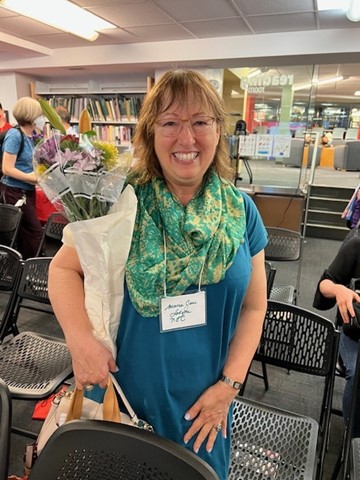
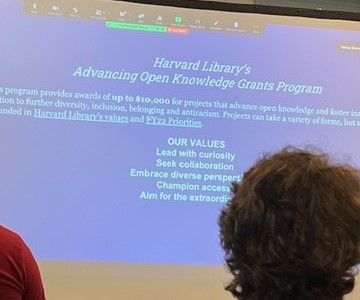
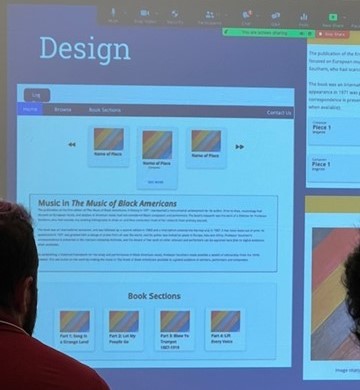
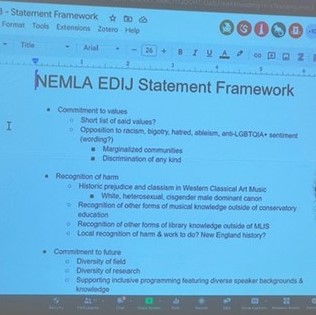
NEMLA Officers
Publication Information
New England Quarter Notes is published quarterly in the fall, winter, spring, and summer.
Back issues may be accessed from:
http://nemla.musiclibraryassoc.org/resources/newsletters/
Address all correspondence concerning editorial matters to:
Jennifer Hadley
jthom at wesleyan.edu
Inquiries concerning subscription, membership and change of address should be directed to:
Hannah Ferello
hannah.ferello at necmusic.edu
Membership year runs July 1st to June 30th.
Regular Personal Membership:$12.00
Student and Retired Membership:$6.00
Institutional Membership$16.00
Return to the New England Music Library Association home page

